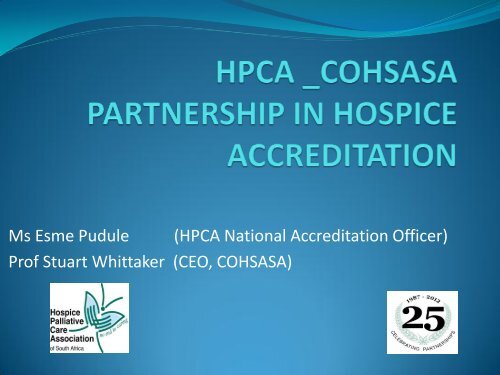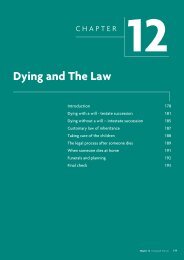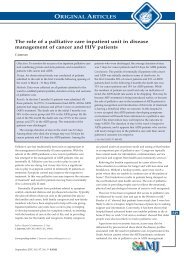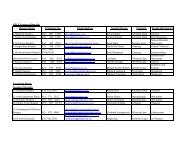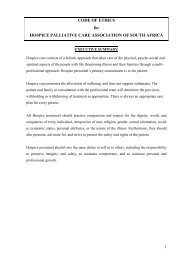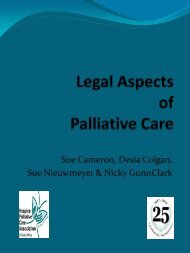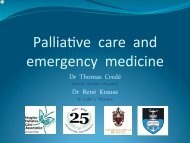Partnerships in Hospice Accreditation.pdf - Hospice Palliative Care ...
Partnerships in Hospice Accreditation.pdf - Hospice Palliative Care ...
Partnerships in Hospice Accreditation.pdf - Hospice Palliative Care ...
You also want an ePaper? Increase the reach of your titles
YUMPU automatically turns print PDFs into web optimized ePapers that Google loves.
Ms Esme Pudule<br />
Prof Stuart Whittaker (CEO, COHSASA)<br />
(HPCA National <strong>Accreditation</strong> Officer)
Content of Presentation<br />
• The History of the HPCA_COHSASA Partnership<br />
• Brief overview of the HPCA evaluation process and the<br />
COHSASA accreditation programme<br />
• The systems approach to quality improvement<br />
• Safety and quality of hospice palliative care programmes<br />
• Future opportunities for collaboration and partnership
<strong>Hospice</strong> Development through<br />
Mentorship and <strong>Accreditation</strong><br />
Vision: <strong>Palliative</strong> care for all<br />
Mission: by support<strong>in</strong>g member hospices and partner<br />
organisation to promote quality <strong>in</strong> life, dignity <strong>in</strong> death<br />
and support <strong>in</strong> bereavement to all persons liv<strong>in</strong>g with a<br />
life-threaten<strong>in</strong>g illness<br />
HPCA is committed to support<strong>in</strong>g its member hospices<br />
and to assist them to develop <strong>in</strong>to key palliative care<br />
resources <strong>in</strong> the respective health districts.
Brief Overview of HPCA Evaluation<br />
Process prior to COHSASA <strong>Accreditation</strong><br />
1998: The first HPCA cl<strong>in</strong>ical standards were <strong>in</strong>troduced<br />
1998- 2003: A process of peer review assessment was<br />
implemented and member hospices were awarded an<br />
HPCA certificate for compliance
Beg<strong>in</strong>n<strong>in</strong>g Our Journey <strong>in</strong> 2003<br />
HPCA-COHSASA Collaboration <strong>in</strong>itiated by:<br />
Prof JP van Niekerk<br />
And<br />
Professor Stuart Whittaker<br />
The First meet<strong>in</strong>g was held <strong>in</strong> August 2003<br />
PEPFAR fund<strong>in</strong>g became available<br />
<strong>in</strong> 2004
Brief History of HPCA-COHSASA Partnership<br />
2004: 1 st edition of HPCA palliative care standards was<br />
<strong>in</strong>troduced and the 1 st tra<strong>in</strong><strong>in</strong>g of HPCA surveyors by<br />
COHSASA<br />
2005: The COHSASA accreditation programme was<br />
<strong>in</strong>itiated<br />
2009: 2 nd edition of HPCA palliative care standards<br />
received ISQua accreditation<br />
2009: HPCA implemented an <strong>in</strong>ternal star rat<strong>in</strong>g process
Initial HPCA surveyor tra<strong>in</strong><strong>in</strong>g by COHSASA -2004<br />
Surveyor tra<strong>in</strong><strong>in</strong>g <strong>in</strong> 2009<br />
Surveyor tra<strong>in</strong><strong>in</strong>g <strong>in</strong> 2010
HPCA Star rat<strong>in</strong>g process prior to the<br />
COHSASA accreditation process<br />
STAR 4<br />
STAR 5<br />
COHSASA<br />
<strong>Accreditation</strong><br />
STAR 3<br />
STAR 2<br />
STAR 1
90<br />
80<br />
82<br />
Number of HPCA members<br />
2009/10 - 2011/12<br />
70<br />
60<br />
50<br />
40<br />
30<br />
20<br />
10<br />
0<br />
61<br />
28 29 27 27<br />
24<br />
21 21<br />
21<br />
16 14<br />
14<br />
8 8<br />
5<br />
Number of HPCA<br />
members (2009/10)<br />
Number of HPCA<br />
members (2010/11)<br />
53<br />
40<br />
Number of HPCA<br />
members (2011/12)<br />
Affilliates<br />
Star 1<br />
Star 2<br />
Star 3<br />
Star 4<br />
Star 5
HPCA Membership Star Rat<strong>in</strong>g<br />
HPCA<br />
MEMBERSHIP<br />
RATING<br />
ASSESSMENT<br />
TOOL<br />
ASSESSMENT<br />
REQUIREMENT<br />
STAR 1<br />
*<br />
STAR 2<br />
**<br />
Star 1 Assessment • Overall score of 80%<br />
• Compliant with all critical<br />
criteria<br />
Star 2 Assessment • Overall score of 80%<br />
• Compliant with all critical<br />
criteria
HPCA<br />
MEMBERSHIP<br />
RATING<br />
STAR 3<br />
***<br />
STAR 4<br />
****<br />
STAR 5<br />
*****<br />
ASSESSMENT<br />
TOOL<br />
2 nd edition of<br />
HPCA/COHSASA<br />
palliative care<br />
standards<br />
HPCA/COHSASA<br />
palliative care<br />
standards<br />
HPCA/COHSASA<br />
palliative care<br />
standards<br />
ASSESSMENT<br />
REQUIREMENT<br />
• >60% <strong>in</strong> SE 1, 2, 3, 6, 7, 8, 9, (+10 and 11 where<br />
applicable)<br />
• Overall average of at least 50% and an average of<br />
not<br />
less than 40% <strong>in</strong> SE 4, 5 and 12<br />
• >70% <strong>in</strong> SE 1, 2, 3, 6, 7, 8, 9, (+10 and 11 where<br />
applicable)<br />
• At least 60% <strong>in</strong> SE 4, 5 and 12<br />
(A Cohsasa survey will only be requested when >80%<br />
is achieved <strong>in</strong> all except 2 SEs which need to score at<br />
least 75%)<br />
• >80% <strong>in</strong> all SE’s.<br />
• Compliant with all critical criteria
The <strong>in</strong>troduction of accreditation
GHANA<br />
COHSASA<br />
The Council for Health Service<br />
<strong>Accreditation</strong> of Southern Africa<br />
(COHSASA):<br />
• is a not-for-profit <strong>in</strong>ternationally<br />
accredited accreditation organisation<br />
established <strong>in</strong> 1995;<br />
• has worked with 777 healthcare facilities <strong>in</strong><br />
11 African countries, <strong>in</strong>clud<strong>in</strong>g South<br />
Africa;<br />
• is work<strong>in</strong>g with HPCA s<strong>in</strong>ce 2003 as a<br />
partner <strong>in</strong> accredit<strong>in</strong>g compliant facilities
The Donabedian <strong>in</strong>fluence<br />
In 1950, the “father of quality” Armenian Professor Avedis Donabedian<br />
<strong>in</strong>troduced a framework for conceptualiz<strong>in</strong>g health care <strong>in</strong>to three <strong>in</strong>teractive<br />
components:<br />
Standards<br />
Structure<br />
Group<strong>in</strong>gs of<br />
<strong>in</strong>terrelated<br />
elements<br />
Process<br />
That act together<br />
<strong>in</strong> an environment<br />
/ sett<strong>in</strong>g<br />
Outcomes<br />
To achieve good/<br />
bad outcomes<br />
Indicators<br />
And cont<strong>in</strong>uous<br />
quality improvement<br />
A number of his followers started the International Society for<br />
Quality <strong>in</strong> Health <strong>Care</strong> (ISQua)
The International Society for Quality <strong>in</strong><br />
Healthcare (ISQua)<br />
• A not-for-profit organisation.<br />
• Established <strong>in</strong> 1985 to discuss the assurance of quality <strong>in</strong><br />
medic<strong>in</strong>e.<br />
• Vision and mission:<br />
Driv<strong>in</strong>g cont<strong>in</strong>ued improvement <strong>in</strong> the quality and safety of<br />
healthcare worldwide through education, research, collaboration<br />
and the dissem<strong>in</strong>ation of evidenced-based knowledge.<br />
The International <strong>Accreditation</strong> Council developed with<strong>in</strong> the<br />
ISQua organisation
What is <strong>Accreditation</strong>?<br />
<strong>Accreditation</strong> (A Rooney and P vanOstenburg):<br />
“A formal process by which a recognized body, usually a nongovernmental<br />
organization (NGO), assesses and recognizes that a<br />
health care organization meets applicable pre-determ<strong>in</strong>ed and<br />
published standards.<br />
<strong>Accreditation</strong> standards are usually regarded as optimal and<br />
achievable, and are designed to encourage cont<strong>in</strong>uous improvement<br />
efforts with<strong>in</strong> accredited organizations.<br />
Follow-up accreditation surveys are typically conducted every two to<br />
three years.”<br />
(Rooney AL, vanOstenberg PR. Licensure, accreditation, and certification: approaches to<br />
health services quality. Center for Human Services (CHS), 1999.)
<strong>Accreditation</strong> programmes developed<br />
around the world<br />
By 2000 there were 36<br />
identified.<br />
The number of<br />
programmes has<br />
doubled every five<br />
years s<strong>in</strong>ce 1990.<br />
(Graph: Charles Shaw)
ISQua Internationally Accredited <strong>Accreditation</strong> Bodies<br />
(Re-accreditation required every 4 years)<br />
As at January 2011, 17 of the 42 accredit<strong>in</strong>g bodies had been accredited by ISQua<br />
Accredited Organisations<br />
Date of First<br />
<strong>Accreditation</strong><br />
Health and Disability Audit<strong>in</strong>g New Zealand - HDANZ 1996<br />
The Australian Council on Healthcare Standard - ACHS 1997<br />
<strong>Accreditation</strong> Canada 1998<br />
Council for Health Service <strong>Accreditation</strong> of Southern Africa - COHSASA 2002/6/10<br />
Australian General Practice <strong>Accreditation</strong> Limited / Quality <strong>in</strong> Practice -<br />
QIP/AGPAL<br />
2005/11<br />
Quality Improvement Council and the QIC <strong>Accreditation</strong> Program, Australia - QIC 2006<br />
Taiwan Jo<strong>in</strong>t Commission on Healthcare <strong>Accreditation</strong> - TJCHA 2006<br />
Standards of the Jo<strong>in</strong>t Commission International, - JCI 2007<br />
Healthcare <strong>Accreditation</strong> Quality Unit, United K<strong>in</strong>gdom - CHKS-HAQU 2007<br />
Malaysian Society for Quality <strong>in</strong> Health - MSQH 2008<br />
American Association of Blood Banks, <strong>Accreditation</strong> and Quality Programme - AABB 2009<br />
Aged <strong>Care</strong> Standards and <strong>Accreditation</strong> Agency, Australia - ACSAA 2009<br />
Health <strong>Care</strong> <strong>Accreditation</strong> Council of Jordan - HCAC 2009<br />
Health <strong>Accreditation</strong> System of Instituto Colombiano de Normas Técnicas y Certificación,<br />
Co - ICONTEC<br />
2009<br />
Global-Mark Pty Ltd, Healthcare Certification Programme 2009<br />
Netherlands Institute for <strong>Accreditation</strong> <strong>in</strong> Healthcare - NIAZ 2009<br />
Haute Autorité de santé – HAS <strong>in</strong> France 2010
The tools: Standards<br />
Standards:<br />
def<strong>in</strong>e the key functions, activities, processes and<br />
structures required <strong>in</strong> order to provide quality<br />
services<br />
Should be determ<strong>in</strong>ed by professional bodies,<br />
health care professionals, staff, patients and<br />
citizens.
ISQua pr<strong>in</strong>ciples: the foundation for<br />
standards for healthcare facilities<br />
1. Patient/client- focused<br />
2. Encompass management and support <strong>in</strong>frastructure.<br />
3. Focus on quality and performance improvement.<br />
4. Comprehensive standards (facility-wide)<br />
5. Reflect quality dimensions.<br />
6. Def<strong>in</strong>e plann<strong>in</strong>g and evaluation process.<br />
7. Can be objectively measured.
Develop<strong>in</strong>g standards:<br />
a road map<br />
Five phases:<br />
• Normative<br />
• Empirical (pilot<strong>in</strong>g)<br />
• Consensus<br />
• Publication<br />
• Implementation
Standards cover systems required for quality care<br />
Fundrais<strong>in</strong>g<br />
Holistic<br />
care<br />
Patients<br />
Adm<strong>in</strong>istration<br />
(system = a set of <strong>in</strong>teract<strong>in</strong>g and <strong>in</strong>terdependent<br />
entities that form an <strong>in</strong>tegrated whole)
Hav<strong>in</strong>g standards is not enough,<br />
they must be evaluated and<br />
implemented accurately
1. Surveyors<br />
are tra<strong>in</strong>ed to<br />
understand<br />
standards<br />
4. COHSASA<br />
surveys<br />
conducted<br />
The process of<br />
implement<strong>in</strong>g<br />
standards and<br />
improv<strong>in</strong>g quality<br />
care <strong>in</strong> HPCA<br />
member hospices<br />
2. HPCA<br />
Mentorship<br />
approach for<br />
development<br />
of PC<br />
programmes<br />
3. HPCA<br />
Internal<br />
surveys<br />
conducted to<br />
assess progress<br />
from Star 1-4
When it is believed that a facility substantially complies with<br />
the standards it undergoes an external survey<br />
• Pre-accreditation process<br />
• HPCA surveyors conduct an <strong>in</strong>ternal<br />
survey - Star 4 sites<br />
• Required compliance score of above 80% <strong>in</strong> ALL<br />
service elements <strong>in</strong>clud<strong>in</strong>g all critical criteria<br />
• Quality improvement - Structured cl<strong>in</strong>ical audits<br />
and non - cl<strong>in</strong>ical quality activities
Survey process (cont.)<br />
• Survey team (2-3 members for 2- 2½ days)<br />
1. Documentation review (policies and<br />
procedures, patient record audit, m<strong>in</strong>utes, HR<br />
management and tra<strong>in</strong><strong>in</strong>g records, etc.)<br />
2. Assessment of facilities and equipment<br />
3. Staff <strong>in</strong>terviews (cl<strong>in</strong>ical, reception, practice<br />
manager)
Architecture and Data Capture Process<br />
Aggregated criteria scores are used to determ<strong>in</strong>e standard scores, which <strong>in</strong> turn are<br />
aggregated to PIs, SEs and Overall Facility Scores<br />
Criteria<br />
Standards<br />
Performance<br />
Indicators<br />
COHSASA data capture process:<br />
Criteria assessments are entered directly <strong>in</strong>to<br />
database us<strong>in</strong>g guidel<strong>in</strong>es.<br />
Services and<br />
departments<br />
Elements<br />
OVERALL<br />
Facility<br />
assessment<br />
score<br />
Scores <strong>in</strong> each of these areas:<br />
• range from 0 to 100<br />
• give a measure of the performance <strong>in</strong> that area as shown below:<br />
100 – 90 (Excellent)<br />
89 – 80 (Good)<br />
79 – 40 (Weak)<br />
39 – 5 (Poor)
<strong>Hospice</strong> 1<br />
<strong>Hospice</strong> 2<br />
<strong>Hospice</strong> 3<br />
<strong>Hospice</strong> 4<br />
<strong>Hospice</strong> 5<br />
<strong>Hospice</strong> 6<br />
<strong>Hospice</strong> 7<br />
<strong>Hospice</strong> 8<br />
<strong>Hospice</strong> 9<br />
The Quality Assurance Report<strong>in</strong>g System<br />
Quality Information System should:<br />
• provide cont<strong>in</strong>uous access to current standard<br />
compliance data.<br />
• enable management at all levels to make <strong>in</strong>formed<br />
decisions.<br />
• support ongo<strong>in</strong>g quality improvement programmes.<br />
• assist facilities to reach and ma<strong>in</strong>ta<strong>in</strong> accreditation<br />
standards.<br />
• be a tool for the ongo<strong>in</strong>g monitor<strong>in</strong>g of performance<br />
<strong>in</strong>dicators.<br />
3. Performance <strong>in</strong>dicator scores<br />
100<br />
99<br />
98<br />
97<br />
96<br />
95<br />
94<br />
93<br />
1. Facility overall scores<br />
99 99 98 98 97 99 99 95 99<br />
2. Facility department scores<br />
4. Quality improvement monitor<strong>in</strong>g <strong>in</strong>strument
<strong>Accreditation</strong> award process<br />
<strong>Accreditation</strong><br />
report<br />
Technical<br />
committee<br />
Board
The Graded Recognition Certification<br />
Programme<br />
The Graded Recognition Certification Programme was developed to<br />
assist facilities that do not reach accreditation level<br />
This helps overcome the “all or noth<strong>in</strong>g” fear and motivates facilities to keep<br />
improv<strong>in</strong>g after the external survey:<br />
Pre-accreditation grade<br />
– entry level (roughly 60 - 70% compliance)<br />
Pre-accreditation grade<br />
– <strong>in</strong>termediate level (roughly 85 - 75% compliance)<br />
Full accreditation
DRAKENSTEIN<br />
HOSPICE<br />
GRAHAMSTOWN<br />
HOSPICE<br />
ST FRANCIS<br />
HOSPICE<br />
HELDERBERG<br />
HOSPICE<br />
KNYSNA<br />
SEDGEFIELD<br />
HOSPICE<br />
ST JOSEPH'S CARE<br />
HOSPICE<br />
WITS HOSPICE<br />
SUNGARDENS<br />
HOSPICE<br />
WITS HOSPICE<br />
Overall Survey Scores for <strong>Hospice</strong> facilities:<br />
2005 - 2006<br />
100<br />
80<br />
60<br />
40<br />
20<br />
0<br />
EXTERNAL FOCUS<br />
99 99 98 97 97 97 96 96 96<br />
99 89 82 82 87 82 83
Average <strong>Hospice</strong> Survey Scores per year:<br />
External 2005 - 2012<br />
100<br />
80<br />
60<br />
40<br />
20<br />
0<br />
70 93 95 97 98 96 98 98<br />
2005 2006 2007 2008 2009 2010 2011 2012
Geographic representation of Accredited<br />
<strong>Hospice</strong> Sites: 2012<br />
2yr accreditation<br />
3yr accreditation
Future opportunities for<br />
collaboration and partnership<br />
1. Cont<strong>in</strong>ued external surveys by COHSASA of member<br />
sites.<br />
2. Improved MER process through the implementation<br />
of CoQIS <strong>in</strong> HPCA <strong>in</strong>ternal assessment process.<br />
3. Integrat<strong>in</strong>g pr<strong>in</strong>ciples of palliative care standards<br />
beyond hospice sett<strong>in</strong>gs.<br />
4. Expand<strong>in</strong>g capacity of HPCA surveyors beyond<br />
hospice sett<strong>in</strong>gs.
ACKNOWLEDGEMENTS


